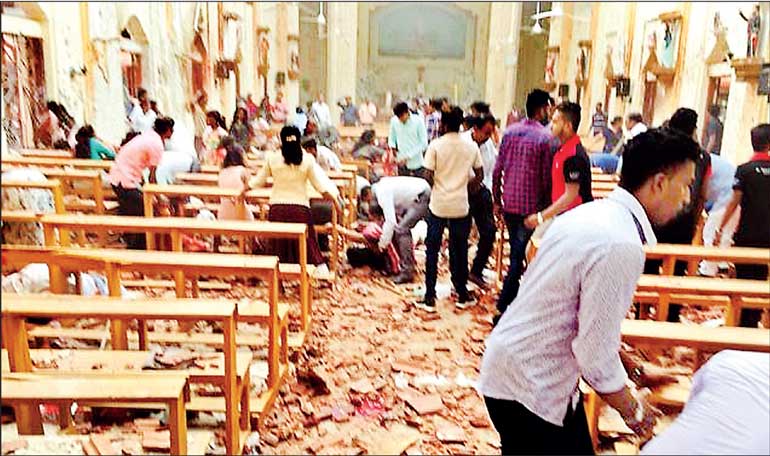Monday Feb 23, 2026
Monday Feb 23, 2026
Friday, 18 April 2025 00:22 - - {{hitsCtrl.values.hits}}

The Easter attacks did more than kill innocent people; they fractured the social fabric of Sri Lanka
 As the sixth commemoration of the tragic Easter Sunday attacks draws near, Sri Lanka finds itself still entangled in a web of unanswered questions, delayed prosecutions, political manoeuvring, and communal wounds that have yet to heal. On 21 April 2019, an unthinkable act of terror unfolded across the country, targeting Catholic worshippers celebrating one of Christianity’s holiest days and foreign nationals enjoying breakfast in Colombo’s five-star hotels. The psychological, political, and communal aftershocks of this catastrophe continue to haunt us to this day.
As the sixth commemoration of the tragic Easter Sunday attacks draws near, Sri Lanka finds itself still entangled in a web of unanswered questions, delayed prosecutions, political manoeuvring, and communal wounds that have yet to heal. On 21 April 2019, an unthinkable act of terror unfolded across the country, targeting Catholic worshippers celebrating one of Christianity’s holiest days and foreign nationals enjoying breakfast in Colombo’s five-star hotels. The psychological, political, and communal aftershocks of this catastrophe continue to haunt us to this day.
Despite numerous investigations—both local and international—along with the appointment of several presidential commissions and committees, the full truth has not yet seen the light of day. What the public has been exposed to are fragments: some corroborative, others contradictory—raising serious doubts about the intent and integrity of those tasked with investigating this national tragedy.
A calculated tragedy or a deep state debacle?
What became increasingly evident over time was the suggestion of a far more complex and sinister plot—what many now refer to as a “deep state” operation. Visible beneficiaries emerged in the immediate political aftermath, and some actors appeared to be either wilfully blind or complicit through inaction.
From my vantage point as a former intelligence officer, what stands out is the abundance of actionable intelligence that preceded the attacks. Local and foreign intelligence services had sounded alarms well in advance. Yet, the system failed—miserably. Was it a case of incompetence, bureaucratic bottlenecks, inter-agency rivalry, or something more deliberate?
There is credible reason to believe that the planning and orchestration of the attacks had international linkages, suggesting that the perpetrators had not only the intent but also the operational capability to exploit our internal weaknesses. That such a sophisticated, multi-pronged attack could take place without a single pre-emptive action being taken raises the most uncomfortable question: was this preventable?
Intelligence agencies under the microscope
The aftermath has seen the public tearing down the once-revered institutions of law enforcement and national security. The accusations—some fair, others misplaced—have undermined the trust and cohesion within and among our security agencies. More damagingly, it has politicised intelligence work, placing officers in the awkward position of having to defend institutional decisions that were likely driven or constrained by political actors.
There is now a dire need to conduct an impartial, apolitical post-mortem of how and why these agencies failed to collaborate. Was it due to turf wars, overenthusiasm, lack of due diligence, or attempts to preserve their credibility in front of political authorities? If justice is to be served, we must stop scapegoating and start asking the right questions—systemically, not selectively.
Legal delays and lingering injustice
While the Supreme Court of Sri Lanka did rule in 2023 that then-President Maithripala Sirisena and several senior officials were liable for their failure to prevent the attacks—and ordered compensation payments—the legal process has stalled in other crucial areas. Many suspects remain in custody without trial, and key cases are delayed repeatedly. Political will has often evaporated after regime changes, with investigations veering in new directions, some seemingly meant to protect key players rather than hold them accountable.
Meanwhile, victims and their families continue to wait—for compensation, for closure, for truth. Justice delayed is justice denied, and in this case, it has been delayed far too long.
A church still in mourning, a still in turmoil
Cardinal Malcolm Ranjith and the Catholic Church have not relented in their pursuit of justice. They continue to demand transparency and accountability, pressing both local and international actors to recognise the systemic failures that allowed this atrocity to occur.
Their struggle has highlighted another painful reality: the lack of a unified national response. Instead of collective mourning and reconciliation, the years since the attacks have seen communities drift further apart, with suspicion and prejudice growing unchecked.
Deepening communal divides
The Easter attacks did more than kill innocent people; they fractured the social fabric of Sri Lanka. Muslims, already under suspicion due to the identity of the bombers, found themselves vilified in public discourse. The subsequent policy to cremate all COVID-19 victims—against Islamic burial rites—was seen as a direct insult to the Muslim community. This decision drew strong condemnation both locally and internationally, yet no formal apology or reparations have been offered to date.
Such State-sanctioned insensitivity has further alienated a key segment of our population and brought disrepute to the Government’s human rights record. It also reignited concerns about selective justice and majoritarian politics.
Political will, not just political talk
As we approach the sixth anniversary of the Easter Sunday massacre, the current Government faces a historic obligation. It must resist the temptation to use this issue for political mileage or deflection. Instead, it must exhibit strong political will to right the wrongs, restore public confidence, and ensure such lapses never occur again.
This involves more than compensating victims or publishing commission reports. It means establishing a credible, bipartisan truth-seeking mechanism, reforming intelligence oversight, speeding up prosecutions, and initiating long-overdue reconciliation programs. Importantly, it means admitting failures—without hiding behind bureaucratic language or political excuses.
We must also stop weaponising national security for political ends. Intelligence agencies must be empowered to act on threats, not paralysed by indecision, rivalry, or political interference. Otherwise, the entire architecture of national security will collapse under the weight of its contradictions.
Let this be the last time
The Easter Sunday tragedy should have been a turning point—a catalyst for deep reform, unity, and healing. Instead, it has become a symbol of what is broken in our systems, institutions, and society.
We owe it to the victims—Catholics, tourists, Muslims, and ordinary Sri Lankans alike—not just to remember them in solemn ceremonies but to honour their memory by ensuring this never happens again.
The sixth commemoration must not be just another ritual. It must be the moment we commit—truly and finally—to truth, justice, and reconciliation.
(The writer served in the Police department for over 40 years, is the former Head of Counter-Terrorism – State Intelligence Service and served as First Secretary (Defence), Embassy of Sri Lanka in Thailand. He is presently a member of Sri Lanka Waqfs Board.)